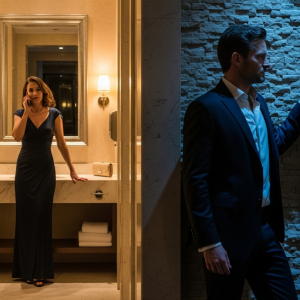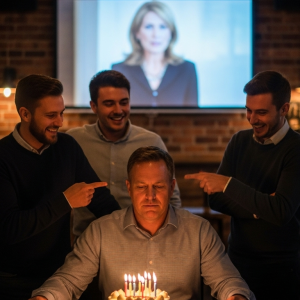On my 45th birthday, my wife and kids made me sit at the head of the table for a “special surprise.” My daughter handed me a box. Inside was a cheap plastic trophy that said, “World’s #1 Disappointment.” They thought it was funny. I smiled, blew out the candles, and cleaned up alone while they watched TV. That night, I made a plan. A week later, my wife showed up at my old job in a bathrobe, screaming that I’d left them with nothing.
I’ve never been the type to air my dirty laundry online. My wife, Ruth, would probably roll her eyes if she knew I was typing this in my garage at 2 a.m. But something happened yesterday that I can’t shake.
I turned 45. I’ve been married to Ruth for 22 years, with two kids, Emily, 19, and Oscar, 14. I’ve worked at the same factory since before Emily was born. Fifty-hour weeks, minimum. It’s not glamorous, but I haven’t missed a mortgage payment in 15 years.
Lately, things have been tense. The factory is talking layoffs. Ruth keeps mentioning downsizing while also eyeing a new kitchen remodel. It makes no sense.
So, yesterday was my birthday. Usually, it’s nothing special. But this year, Ruth texted me at work: Make sure you’re home by 6. Special dinner for your birthday. I’ll admit, something in my chest lightened up. I thought maybe they’d finally noticed how rough the last couple of years have been.
I got home, showered away the factory grime, and came downstairs with a stupid little spark of hope. The dining room table was actually set with the good dishes. There were candles, a homemade-looking cake. For a second, I felt like maybe I mattered.
Ruth pointed to the head of the table. Emily was filming with her phone—the first red flag I ignored. They all sang “Happy Birthday,” but they kept exchanging these little glances.
After the song, Emily handed me a wrapped box. I opened it slowly. Inside was a cheap, gold-colored plastic trophy, the kind you’d get at a dollar store. I turned it around and read the engraving: World’s #1 Disappointment.
For a second, I didn’t process it. Then they all started laughing.
“Give an acceptance speech, Dad!” Emily shouted, zooming in with her phone.
Ruth was practically crying with laughter. “We saw it and just knew it had your name on it!” Oscar high-fived his sister.
Twenty-two years of 60-hour weeks. Missed fishing trips for extra shifts. Driving cars with over 200,000 miles so they could have new phones. And this was my reward.
My face did that thing it learned to do years ago: smile without feeling it. My throat closed up. But I nodded, said, “Thanks,” and even held it up for the camera.
I blew out the four candles on the store-bought cake and made a wish I’m not proud of. While they moved to the living room to watch TV, I cleared the table and washed the dishes. I could hear them laughing. At one point, Emily said something about “his face when he read it,” and there was more laughter.
I put the trophy on the mantle. It seemed like that’s what they wanted. Then I went to the garage, the only space in this house that’s still mine, and sat in my old truck. At 11:43 p.m., my phone buzzed. Emily had tagged me in an Instagram post. It was the video of my reaction, with some song about losers in the background. The caption: Dad’s big moment! #dadfails #disappointmenttrophy #birthdayfail. It already had 812 likes.
A man can only be a disappointment if he continues to seek approval from those who have decided to withhold it. I’ve been trying to fill a bucket with a hole in the bottom for too long. Message received.
That morning, at 6:15 a.m., I called in sick for the first time in three years. I waited until Ruth, Emily, and Oscar had all left the house. Then I began. I’m a methodical guy. I approached this the same way I’d rebuild a transmission: identify the problem, gather the tools, and rebuild something that actually works.
First stop: our home office. In a folder marked “My Stuff, Don’t Touch,” I found what turned my slow burn into a five-alarm fire. Three hidden credit card statements with a combined balance of over $34,000. Purchases from stores I’d never heard of. A separate cell phone bill for a number I didn’t recognize. I photographed everything.
By noon, I was at a different bank across town. I opened a new checking account in my name only and filled out a change of direct deposit form for my paycheck. By 2 p.m., I had a prepaid phone, paid for in cash. I called Jake, a buddy from my old neighborhood, and secured a clean one-bedroom apartment, ready for immediate move-in.
That night at dinner, I tried one last time. I asked Ruth about maybe seeing a marriage counselor. She laughed. “We don’t need someone charging us a hundred bucks an hour to tell us you need to lighten up.” Emily called me “extra” and rolled her eyes. Oscar didn’t even look up from his phone.
The next day, I signed the lease and got my keys. That night, Ruth was talking about a $12,000 bathroom remodel, asking if I could pull some overtime. I nodded, said I’d see what I could do, all while knowing I wouldn’t be there to install the fixtures.
Saturday morning, Ruth and the kids went to her mother’s for their monthly overnight trip. With the house empty, I put my plan into high gear. I gathered only what was truly mine: my father’s watch, my high school ring, my vinyl records, and two duffel bags of clothes. From the garage, I took my tools—the one thing I absolutely wasn’t leaving behind. In the office, I made copies of every important financial and personal document from the last seven years.
On Sunday morning, I sat at a folding table in my new, sparse apartment and wrote three letters.
To Ruth, I explained that I was leaving, that I’d found the hidden debt, and that 22 years of being treated like an ATM and a punchline had finally run the well dry. I would continue to support Oscar, but I would no longer be financing anyone else’s lifestyle.
To Emily, I wrote that adults face consequences for their cruelty, and filming someone’s humiliation for social media likes isn’t a joke. I told her I’d always love her, but my emergency fund was closed.
To Oscar, I wrote that I wasn’t abandoning him, that this wasn’t his fault, and that he always had a place with me. I included my new phone number and address.
That night, after they returned, and after another “normal” evening, I waited until they were all asleep. I placed the three envelopes on the kitchen table, propped against that damn trophy. At 2:17 a.m., I loaded the last of my things into my truck and backed out of the driveway for the last time.
The next morning, I drove to the regional office where my week-long training was supposed to be. I called my supervisor and told him I wouldn’t be coming back. At all. Then I shut off my regular phone, activated the new one, and drove to a competitor that had been trying to hire me for months. They fast-tracked my paperwork.
Around noon, a coworker from my old job called. Ruth had shown up, in a bathrobe, crying and screaming that I’d left them with nothing. Security had to escort her out. Nothing, I thought. An interesting choice of words.
The first week was like watching a five-car pileup in slow motion. Ruth called my new phone 87 times in the first 48 hours. I didn’t answer. Her voicemails went from screaming to crying to bargaining to threats.
Emily posted a TikTok about me, complete with screenshots of my letter and sad piano music. She called me a toxic deadbeat. It got 6,000 likes before she took it down. Apparently, a woman whose father I’d helped over the years commented, “This isn’t the man I know. The man I know spent a whole weekend fixing my dad’s roof for free after a storm. There’s more to this story.” The comment got a thousand likes, and Emily couldn’t handle the narrative shifting.
By week two, reality began to set in at the house. The mortgage payment bounced. Oscar texted: Hey Dad, the Wi-Fi is out and Mom says we can’t afford to fix it. That was the first crack in my armor. I set up automatic payments for the internet bill directly. A kid needs internet for school. That’s not negotiable. He texted back a thumbs-up emoji, then: Mom’s been crying a lot.
I sat in my truck staring at those words. The rage that had been powering me started to sputter. Not for Ruth, but because Oscar was caught in the blast radius.
Week three, the divorce papers arrived. Ruth was filing on grounds of abandonment. My attorney wasn’t concerned. My documentation was ironclad.
That same week, I ran into a neighbor at the hardware store. He told me Emily had dropped out of college and moved back home. Ruth was trying to sell her designer purses online. The lawn hadn’t been mowed in weeks. The satisfaction I expected to feel didn’t come. Instead, there was just this hollow feeling.
Day 23, my attorney called. Ruth wanted to settle. Her claims of financial abandonment wouldn’t hold up in court. We agreed to meet at a coffee shop.
Ruth showed up 20 minutes late. She looked different—no makeup, hair in a messy ponytail, designer handbag replaced with a canvas tote. We haggled over the life we’d built together like we were at a flea market.
Then she said something that caught me off guard. The trophy and the video had been her idea, not Emily’s. The coffee turned to acid in my stomach. I asked why.
She looked at her cup for a long time. She said she’d been angry for years, felt trapped, and resented me for working so much, even though my work paid for everything. The trophy was her way of “finally expressing how she felt.” When I pointed out she could have just talked to me, she laughed and said she’d tried, but I “never listened.”
We reached a tentative agreement. I’d keep my 401k and my truck. She’d keep the house, but refinance it in her name only.
Day 30, Oscar asked to come over. He showed up with a backpack and a duffel bag. That night, we ordered pizza and watched stupid YouTube videos. It was the most normal I’d felt in a month. Before bed, he asked the question I’d been dreading: “Are you ever coming home?”
I told him the truth. That home is a feeling, and I hadn’t felt at home in that house for a long time. That I’d always be his dad, but I couldn’t be Ruth’s husband anymore. He nodded and said he got it.
Then he pulled something from his backpack. It was the trophy. That damn plastic trophy. He said Emily had thrown it against the wall, but he’d rescued it from the trash. It was slightly cracked now.
I turned it over in my hands. Such a small, cheap thing to end 22 years. But it was never about the trophy. It was about what it represented.
The next morning, Ruth called while Oscar was still asleep. She said she’d started therapy. Her therapist had asked her to list all the ways she’d contributed to our marriage’s breakdown. The list, she admitted, was longer than she’d expected. She wasn’t asking me to come back, but she wanted me to know she was trying to understand. I didn’t know what to say to that, so I just said, “Okay.”
That brings us to today. The divorce is moving forward. My new apartment is starting to feel like mine. Oscar comes over every other weekend. We’re rebuilding a ’67 Mustang together. It gives us something to focus on besides the elephant in the room.
The trophy sits on my bookshelf. Sometimes I look at it and feel that flash of anger. But mostly, it reminds me that I finally had the courage to stop trying to fill a bucket with a hole in the bottom. Is this a happy ending? I don’t know. But it’s an honest one. Sometimes you have to blow up your life to remember what actually matters.
Three months after the coffee shop meeting, the divorce was finalized. No court battles, no dramatic last-minute stunts—just signatures, notarized pages, and the quiet thunk of the clerk’s stamp.
When I walked out of the courthouse, the sun felt strange on my face. I sat in my truck for a few minutes, letting the reality sink in. Twenty-two years, reduced to a manila folder on the passenger seat.
That night, Oscar and I ate takeout burgers at my kitchen counter. “So… it’s done?” he asked.
“Yeah,” I said. “It’s done.”
He took a sip of his soda, staring at the wall. “It’s weird. I thought I’d feel happier about it, but… it’s just different now.”
“Different’s not always bad,” I said. “Sometimes it’s just… different.”
A week later, Emily called. It was the first time we’d spoken since I left.
“I’m sorry, Dad,” she said quickly, before I could answer. “For the video. For the trophy. For all of it.”
I leaned against the wall, listening to her breathe on the other end.
“I was stupid,” she continued. “Mom said it would be funny, and I didn’t think about how it would feel to you. I just wanted… I don’t know. To fit in. To laugh.”
“You wanted likes,” I said.
She didn’t deny it. “I don’t expect you to forgive me right away. But I’d like to see you. Maybe for coffee?”
We met at a diner two days later. She looked tired—different from the confident, phone-in-hand daughter I remembered. She pushed her phone aside and didn’t touch it once during breakfast.
“I moved back home to help Mom,” she said. “It’s not what I expected. She’s… different now. More quiet.”
“People change when the mirror finally shows them something they don’t want to see,” I said.
Emily nodded. “I want to come by sometime. See the Mustang.”
The Mustang project became the center of my free time. Oscar and I spent weekends sanding, priming, replacing parts. He was quieter than he used to be, but there was a steadiness in him I hadn’t seen before.
One Saturday, while we worked on the transmission, he said, “You seem happier here.”
“I am,” I said. “It’s not perfect. But it’s mine.”
“Think you’ll ever get married again?” he asked.
“Maybe. If I meet the right person. But right now, I’m learning how to be okay on my own.”
He grinned. “Good. You’re not that much of a disappointment, you know.”
We both laughed.
Around month six, Ruth called again. This time, she sounded different—calmer, more measured.
“I wanted to let you know I’m refinancing the house next week,” she said. “And… I paid off two of those credit cards. The therapy’s helping.”
“That’s good,” I said.
“I’m not asking for anything,” she added quickly. “I just… wanted you to know I’m trying to fix what I broke. Not to get you back. Just because it’s the right thing to do.”
For the first time since I’d left, I believed her.
Oscar brought the trophy over one weekend and set it on the counter.
“You should smash it,” he said.
“Nah,” I said. “It’s a reminder.”
“Of what?”
“That I don’t need to win their approval to matter,” I said. “And that when someone tells you who they think you are, you don’t have to accept it.”
He looked at it for a long time. “Maybe I’ll keep it when you’re done with it.”
“Deal,” I said.
The following spring, the Mustang was finally roadworthy. Oscar and I took it for a drive with the windows down, the engine roaring like it had been waiting decades to be free.
“This is awesome,” he shouted over the wind.
“Worth the work,” I said.
We stopped for burgers at a roadside stand, and as we ate, I thought about how far things had shifted. I had less money, fewer possessions, and a smaller circle—but what I had now felt real.
Emily started coming around more. She helped paint the apartment one weekend, and we actually talked—really talked—for the first time in years. She admitted she’d been embarrassed by me before, because I wasn’t flashy or ambitious in the way her friends’ dads were.
“And now?” I asked.
“Now I think you might be the only adult in the family who had the guts to walk away when things were bad,” she said.
That meant more than I could tell her.
On the one-year anniversary of the night I left, I sat in the garage, the Mustang parked beside me. The trophy was on the workbench, still cracked. I ran my fingers over the cheap plastic letters.
Ruth had sent a short text earlier: Thank you for leaving when you did. I wouldn’t have changed if you hadn’t.
I didn’t reply. I didn’t need to.
The truth is, leaving wasn’t about revenge. It wasn’t even about the debt or the insults or the trophy. It was about finally believing that I deserved better than being the butt of a joke in my own home.
A man can only be a disappointment if he’s still playing a game he didn’t sign up for. I stopped playing.
Now, my days are quieter. I work fewer hours. I cook more. I see my kids on my terms, and when we’re together, it feels like time well spent, not an obligation.
Sometimes, I look at the trophy and think about how it all started. And then I look at the Mustang, gleaming in the afternoon sun, and think about how it’s going.
Not a happy ending, maybe. But an honest one. And that’s enough.




